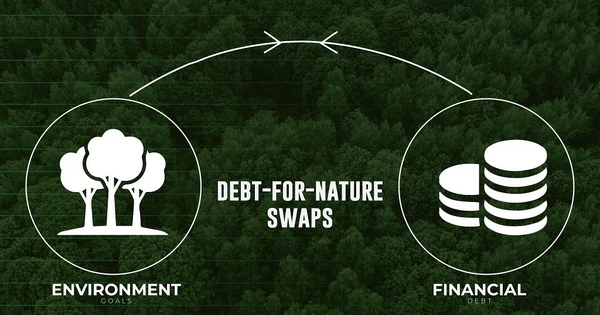Gabon Announces Africa’s First Debt-for-Nature Swap

The Nature Conservancy (TNC), a prominent global conservation organization, has partnered with the Government of Gabon to unveil a pioneering financial arrangement.
This innovative initiative involves the restructuring of $500 million of Gabon’s national debt, aiming to infuse approximately $163 million into ocean conservation efforts. The transaction’s significance lies in its launch of a sustained conservation project and the introduction of a fresh revenue stream.
This financing will aid Gabon’s goal to protect 30 percent of its oceanic territories, in alignment with its broader commitment to safeguard 30 percent of its lands, freshwater systems, and oceans by 2030.
Notably, this marks the fourth instance of TNC’s Blue Bonds for Ocean Conservation program and represents the first ‘debt conversion’ of this kind in Mainland Africa. Additionally, this initiative stands out as the largest accumulation of debt for a TNC-led endeavor.
Gabon’s coastal and marine regions serve as the habitat for the world’s largest population of leatherback turtles, accounting for about 30 percent of the global count of this endangered species, along with vital nesting sites. The area also encompasses one of the Atlantic’s largest olive ridley turtle rookeries and is home to the critically endangered Atlantic humpback dolphin.
The Blue Bonds project will contribute resources toward a Marine Spatial Plan intended to expand protected oceanic areas, improve management in existing and potential protected zones, and support Gabon’s sustainable ‘blue economy.’
Additionally, it will aid Gabon in reinforcing and enforcing regulations in its fishing industry, where illicit activities are estimated to cause annual losses of $610 million.
Today’s announcement marks the successful conclusion of the debt conversion process, ushering in a 15-year conservation campaign for Gabon. As part of this transaction, proceeds from a fresh bond issuance, coordinated by Bank of America, were employed to restructure a portion of Gabon’s existing national debt.
The US International Development Finance Corporation has provided political risk insurance of up to $500 million for the financing, thus reducing Gabon’s debt-related expenses. This effort will enable the nation to allocate yearly contributions to an independent Conservation Fund and an endowment, ensuring continued conservation efforts even after the bonds are repaid.
This endeavor is the most recent addition to TNC’s “Blue Bonds for Ocean Conservation” initiative, a comprehensive strategy aligned with global and national commitments to amplify ocean preservation efforts and address pressing biodiversity challenges through enhanced marine management. Gabon is the fourth participant in TNC’s Blue Bonds portfolio, joining Seychelles, Belize, and Barbados.
The Blue Bonds program merges conservation financing with scientific and marine planning expertise, allowing governments to unlock substantial funds to support conservation and climate goals while simultaneously benefitting their populace and economies.
To date, the program has successfully restructured over $1.2 billion of debt on a global scale, with an anticipated yield of over $400 million in fresh funding for conservation, supporting the protection and effective management of more than 176 million hectares (about 1.8 million square kilometers) of ocean—an expanse larger than the Gulf of Mexico.
Gabon’s President Ali Bongo Ondimba hailed the launch of the nation’s Blue Bond, expressing hope for the proliferation of green and blue financial mechanisms.
He called on developed nations and multilateral banks to replicate such initiatives, which hold potential to address the critical challenges of climate change and biodiversity loss.
Jennifer Morris, CEO of The Nature Conservancy, highlighted the fusion of finance, science, and marine planning at the core of the Blue Bonds program. Morris emphasized that the Gabon project unlocks a substantial conservation fund generated through new bond issuances, facilitated by political risk insurance from the US International Development Finance Corporation. This innovative approach exemplifies financial opportunities that advance both biodiversity and climate goals.
Gabon boasts a diverse coastal and marine ecosystem hosting over 1,000 IUCN-Red Listed marine species, including sea turtles, sharks, whales, and dolphins, with 126 listed as critically endangered or threatened.
The nation’s oceanic environment plays a crucial role in nesting turtles and the migratory route of humpback whales. Gabon’s mangrove forests represent a significant carbon reservoir with potential climate change mitigation benefits.
Despite the ocean’s substantial contribution of approximately $3 trillion annually to global GDP, marine conservation remains one of the least funded United Nations’ sustainable development goals.
This represents a missed economic, climate, and biodiversity opportunity. While the world depends heavily on healthy oceans, funding marine conservation and climate adaptation efforts remains a considerable challenge for many countries, despite their pressing need for such measures.
